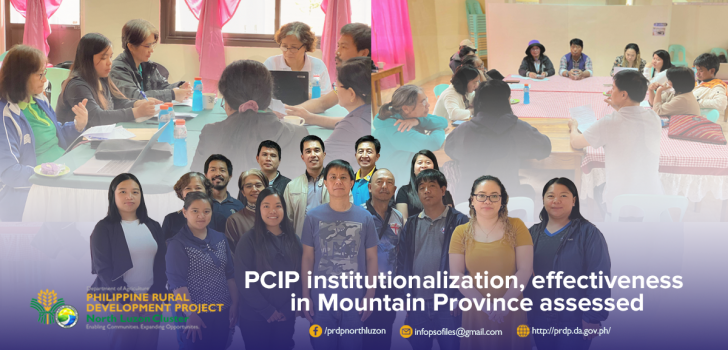
PCIP institutionalization, effectiveness in Mountain Province assessed
To look into the effectiveness and level of institutionalization of the Commodity Investment Plan (CIP) at the LGU level, the DA-PRDP Regional Project Coordination Office – CAR, together with the Project Support Office (PSO) North Luzon held an assessment activity in Bontoc, Mountain Province from November 29 – 30, 2023.
Various stakeholders were invited to gather their insights and experiences on the effectiveness and usefulness of the PRDP planning tool in identifying and implementing agri-fishery projects in the province. The data gathering was done through Focus Group Discussions (FGDs) and Key Informant Interviews (KIIs).
Participants were from the attached offices at the PLGU (Office of the Provincial Agriculture, Planning Development Office, Department of Agrarian Reform (DAR), and Environment and Natural Resources Office (ENRO), farmer cooperatives (Sadsadan Vegetable Producers (SAVPI), Aliwes Irrigators Association, Sagada Arabica Coffee Growers and Processors Organization (SACGPO), Besao Multi-Purpose Cooperative, and Anabel Sadanga Multi-Purpose Cooperative), and other government agencies (DENR, PENRO, DPWH, DOST, and FPA).
The FGD and KII with the participating industry players seek to generate essential data relative to the level of integration or institutionalization of the commodity investment plan at the LGU level, in terms of the formulation process, implementation, and emerging benefits from utilizing the tool.
Specifically, the administered guide questions seek to know the level of participation or involvement of the stakeholders and the facilitating and constraining factors in PCIP formulation/updating, and utilization of the tool in the context of planning, programming, and budgeting processes, and investment prioritization with and without the CIP.
Likewise, it intends to spot issues, gaps, and best practices and recommend strategies and approaches to maximize the use of PCIP to guide the LGUs in planning and developing their agri-fishery sector.
For Mary Jane Tumapang, Provincial Government Asst. Department Head of the Provincial Agriculture Office, the formulation of CIP in their province is a great tool for funding interventions as it is based on the value chain analysis of priority commodities. She added that before, projects and programs for agriculture were only proposal-based, however, they did not have a basis for starting such interventions.
“Sa CIP, very important yan lalo na sa agri-fishery sector. Dati kasi sa Provincial Agriculture, nung pumunta ako don wala pa akong nakitang Provincial Agricultural Development Plan, it is always yung plan ng agriculture is embodied sa provincial master plan ng province kaya limited,” Tumapang said.
“Kaya I appreciate very much yung formulation ng Commodity Investment Plan kasi it focuses on the agri-fishery sector and also it focuses on the development of major commodities that need or which have potential in the province,” she added.
Meanwhile, findings from the assessment will be analyzed to formulate strategies for enhancing PCIP formulation and utilization in the Mountain Province. ### (Ericson Guiao, PSO North Luzon InfoACE)
